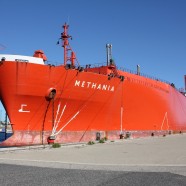A Belgian LNG carrier stranded in Marseille
Not far away from the Corse, on a deserted wharf, another ship is waiting for demolition. Methania was said to be already living in borrowed times in 2007, was struck by a lightning in Zeebrugge in 2008, on technical stops or in lay-up at Brest in 2013 and in 2014, and has been berthed at Marseille since mid-December 2014. Works to be carried out at Marseille repair yard were postponed. They were supposed to last for 2 months. Methania’s obsolete equipment, the availability of larger and more fuel-efficient units manned by less crews deprive her of long term or short term chartering.
Cannes: the sale of ivory under police protection
Following the lead of the United States, Sweden, the United Kingdom and Germany, France decided to ban from its soil the exportation of raw and cut ivory.
Cannes Enchères (Cannes Auctions) took the responsibility to circumvent this decision by proposing to future Asian buyers the sale of these tusks on Saturday, March 7. They will do this by shipping the tusks through Belgium and by benefiting from re-exportation certificates delivered by Belgian authorities. Belgium has not yet followed the lead of the four other European countries. Alerted to this prospect, the Belgian Minister of Energy, of the Environment and of Sustainable Development just declared that if this ivory arrives in Belgium for purposes of exportation outside of the European Union, she will halt it for investigation. Ms. Marghem, the minister, is also calling for a global European accord on the ban of the re-exportation of ivory tusks from the European Union.
Cannes: the sale of ivory under police protection
Following the lead of the United States, Sweden, the United Kingdom and Germany, France decided to ban from its soil the exportation of raw and cut ivory.
Cannes Enchères (Cannes Auctions) took the responsibility to circumvent this decision by proposing to future Asian buyers the sale of these tusks on Saturday, March 7. They will do this by shipping the tusks through Belgium and by benefiting from re-exportation certificates delivered by Belgian authorities. Belgium has not yet followed the lead of the four other European countries. Alerted to this prospect, the Belgian Minister of Energy, of the Environment and of Sustainable Development just declared that if this ivory arrives in Belgium for purposes of exportation outside of the European Union, she will halt it for investigation. Ms. Marghem, the minister, is also calling for a global European accord on the ban of the re-exportation of ivory tusks from the European Union.
Ivory: the Cannes scandal
On 27 January 2015 the French Minister of Ecology gave instructions to services to not further deliver CITES certificates (1) for re-export of raw tusks or ivory tusk sections. She also called upon the European Commission so as for “Member States to no longer encourage demand by exporting legal ivory, being proven that it plays an important role in development of illegal slaughter of elephants.” This decision was applauded by 39 Non-Governmental Organizations around the world who had asked Madam Royal to take such action. (2)
Ivory: the Cannes scandal
On 27 January 2015 the French Minister of Ecology gave instructions to services to not further deliver CITES certificates (1) for re-export of raw tusks or ivory tusk sections. She also called upon the European Commission so as for “Member States to no longer encourage demand by exporting legal ivory, being proven that it plays an important role in development of illegal slaughter of elephants.” This decision was applauded by 39 Non-Governmental Organizations around the world who had asked Madam Royal to take such action. (2)









